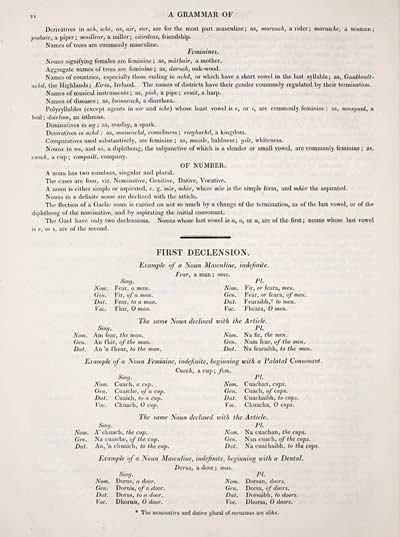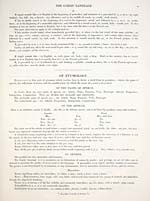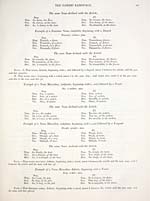Download files
Complete book:
Individual page:
Thumbnail gallery: Grid view | List view

vi A GRAMMAR OF
Derivatives in ach, iche, as, air, ear, are for the most part masculine; as, marcach, a rider; maraichc, a seaman;
piobair, a piper ; midllear, a miller ; càirdeas, friendship.
Names of trees are commonly masculine.
Feniinines.
Nouns signifying females are feminine ; as, màthair, a mother.
Agrgregate names of trees are feminine ; as, darach, oak-wood.
Names of countries, especially those ending in achd, or which have a short vowel in the last syllable ; as, Gaidhealt-
aclid, the Highlands; Eirin, Ireland. The names of districts have their gender commonly regulated by their termination.
Names of musical instruments ; as, piob, a pipe ; cruit, a harp.
Names of diseases ; as, buinneach, a diarrhoea.
Polysyllables (except agents in air and iche) whose least vowel is e, or i, are commonly feminine ; as, neasgaid, a
boil ; doirlinn, an isthmus.
Diminutives in ag ; as, sradag, a spark.
Derivatives in achd ; as, maiseachd, comeliness ; rioghachd, a kingdom.
Comparatives used substantively, are feminine ; as, maoile, baldness ; gile, whiteness.
Nouns in ?<a, and ui, a diphthong, the subjunctive of which is a slender or small vowel, are commonly feminine; as.
cuach, a cup; compailt, company.
OF NUMBER.
A noun has two numbers, singular and plural.
The cases are four, viz. Nominative, Genitive, Dative, Vocative.
A noun is either simple or aspirated, e. g. mbr, mhor, where mor is the simple form, and mhbr the aspirated.
Nouns in a definite sense are declined with the article.
The flection of a Gaelic noun is carried on not so much by a change of the termination, as of the last vowel, or of the
diphthong of the nominative, and by aspirating the initial consonant.
The Gael have only two declensions. Nouns whose last vowel is a, o, or «, are of the first ; nouns whose last vowel
is e, or I, are of the second.
FIRST DECLENSION.
Example of a Noun Masculine, indefinite.
Fear, a man ; mas.
Sing. PI.
Norn. Fear, a man. Nam. Fir, or feara, men.
Gen. Fir, of a man. Gen. Fear, or feara, of men.
Dat. Fear, to a man. Dat. Fearaibh,* to men.
Voc. Fhir, man. Voc. Fheara, men.
The same Noun declined with the Article.
Sing. PL
Norn. Am fear, the man. Nom. Na fir, the men.
Gen. An fhir, of the man. Gen. Nam fear, of the men.
Dat. An 'n fhear, to the man. Dat. Na fearaibh, to the men.
Example of a Noun Feminine, indefinite, heginning with a Palatal Consonant.
Cuach, a cup ; fern.
Sing. PL
Nom. Cuach, a cup. Nom. Cuachan, cups.
Gen. Cuaiche, of a cup. Gen. Cuach, of cups.
Dat. Cuaich, to a cup. Dat. Cuachaibh, to cups.
Voc. Chuach, cup. Voc. Chuacha, cups.
The same Noun declined ivilh the Article.
Sing. PL
Nom. A' chuach, the cup. Nom. Na cuachan, the cups.
Gen. Na cuaiche, o/ </ie cup. Gen. ^wa c\ia.ch, of the cups.
Dat. An,'n chuaich, to the cup. Dat. Na cuachaibh, to the cups.
Example of a Noun Masculine, indefinite, beginning xoith a Dental.
Doras, a door ; mas.
Sing. PL
Nom. Dorus, a door. Nom. Dorsan, doors.
Gen. Doruis, of a door. Gen. Dorsit, of doors.
Dat. Dorus, to a door. Dat. Dorsaibh, to doors.
Voc. Dhoruis, door. Voc. Dhorsa, doors.
* The nominative and dative plural of surnames are alike.
Derivatives in ach, iche, as, air, ear, are for the most part masculine; as, marcach, a rider; maraichc, a seaman;
piobair, a piper ; midllear, a miller ; càirdeas, friendship.
Names of trees are commonly masculine.
Feniinines.
Nouns signifying females are feminine ; as, màthair, a mother.
Agrgregate names of trees are feminine ; as, darach, oak-wood.
Names of countries, especially those ending in achd, or which have a short vowel in the last syllable ; as, Gaidhealt-
aclid, the Highlands; Eirin, Ireland. The names of districts have their gender commonly regulated by their termination.
Names of musical instruments ; as, piob, a pipe ; cruit, a harp.
Names of diseases ; as, buinneach, a diarrhoea.
Polysyllables (except agents in air and iche) whose least vowel is e, or i, are commonly feminine ; as, neasgaid, a
boil ; doirlinn, an isthmus.
Diminutives in ag ; as, sradag, a spark.
Derivatives in achd ; as, maiseachd, comeliness ; rioghachd, a kingdom.
Comparatives used substantively, are feminine ; as, maoile, baldness ; gile, whiteness.
Nouns in ?<a, and ui, a diphthong, the subjunctive of which is a slender or small vowel, are commonly feminine; as.
cuach, a cup; compailt, company.
OF NUMBER.
A noun has two numbers, singular and plural.
The cases are four, viz. Nominative, Genitive, Dative, Vocative.
A noun is either simple or aspirated, e. g. mbr, mhor, where mor is the simple form, and mhbr the aspirated.
Nouns in a definite sense are declined with the article.
The flection of a Gaelic noun is carried on not so much by a change of the termination, as of the last vowel, or of the
diphthong of the nominative, and by aspirating the initial consonant.
The Gael have only two declensions. Nouns whose last vowel is a, o, or «, are of the first ; nouns whose last vowel
is e, or I, are of the second.
FIRST DECLENSION.
Example of a Noun Masculine, indefinite.
Fear, a man ; mas.
Sing. PI.
Norn. Fear, a man. Nam. Fir, or feara, men.
Gen. Fir, of a man. Gen. Fear, or feara, of men.
Dat. Fear, to a man. Dat. Fearaibh,* to men.
Voc. Fhir, man. Voc. Fheara, men.
The same Noun declined with the Article.
Sing. PL
Norn. Am fear, the man. Nom. Na fir, the men.
Gen. An fhir, of the man. Gen. Nam fear, of the men.
Dat. An 'n fhear, to the man. Dat. Na fearaibh, to the men.
Example of a Noun Feminine, indefinite, heginning with a Palatal Consonant.
Cuach, a cup ; fern.
Sing. PL
Nom. Cuach, a cup. Nom. Cuachan, cups.
Gen. Cuaiche, of a cup. Gen. Cuach, of cups.
Dat. Cuaich, to a cup. Dat. Cuachaibh, to cups.
Voc. Chuach, cup. Voc. Chuacha, cups.
The same Noun declined ivilh the Article.
Sing. PL
Nom. A' chuach, the cup. Nom. Na cuachan, the cups.
Gen. Na cuaiche, o/ </ie cup. Gen. ^wa c\ia.ch, of the cups.
Dat. An,'n chuaich, to the cup. Dat. Na cuachaibh, to the cups.
Example of a Noun Masculine, indefinite, beginning xoith a Dental.
Doras, a door ; mas.
Sing. PL
Nom. Dorus, a door. Nom. Dorsan, doors.
Gen. Doruis, of a door. Gen. Dorsit, of doors.
Dat. Dorus, to a door. Dat. Dorsaibh, to doors.
Voc. Dhoruis, door. Voc. Dhorsa, doors.
* The nominative and dative plural of surnames are alike.
Set display mode to: Large image | Transcription
Images and transcriptions on this page, including medium image downloads, may be used under the Creative Commons Attribution 4.0 International Licence unless otherwise stated. ![]()
| Early Gaelic Book Collections > Blair Collection > Gaelic dictionary, in two parts > (28) |
|---|
| Permanent URL | https://digital.nls.uk/79284485 |
|---|
| Description | A selection of books from a collection of more than 500 titles, mostly on religious and literary topics. Also includes some material dealing with other Celtic languages and societies. Collection created towards the end of the 19th century by Lady Evelyn Stewart Murray. |
|---|
| Description | Selected items from five 'Special and Named Printed Collections'. Includes books in Gaelic and other Celtic languages, works about the Gaels, their languages, literature, culture and history. |
|---|

